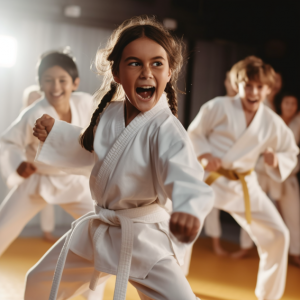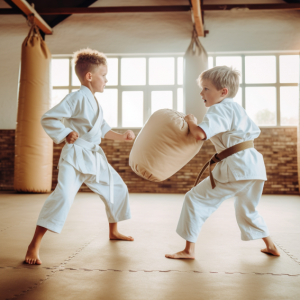Autism is a developmental disorder that affects communication, social interaction, and behavior. Autistic children may face unique challenges when it comes to physical activity and socialization. However, martial arts training can often bridge the gap and provide numerous benefits for these children.
In recent years, it has been discovered that martial arts is an effective therapeutic tool: it can provide improved physical fitness and motor skills as well as enhanced social and emotional development. Let’s explore how your child can benefit from training with us.
 Improved Focus and Attention: Martial arts training provides a structured, engaging, and stimulating environment that can help improve focus and attention in autistic children. A good instructor will structure a program for your child that will build on their current strengths and weaknesses while also working towards improving them.
Improved Focus and Attention: Martial arts training provides a structured, engaging, and stimulating environment that can help improve focus and attention in autistic children. A good instructor will structure a program for your child that will build on their current strengths and weaknesses while also working towards improving them.
Martial arts involves practicing specific movements or techniques, which requires focus and attention to detail. This can help children with autism develop better focus and concentration skills, which can carry over into other areas of their life, such as academics or social situations.
Training also involves mindfulness techniques, such as meditation and controlled breathing. These techniques can help autistic children learn how to regulate their attention and control distractions, which can further improve their focus and attention span.
 Increased Physical Fitness: Martial arts training can improve overall physical fitness, including strength, flexibility, and balance. This can be particularly beneficial for autistic children, who may have difficulty with motor skills or coordination.
Increased Physical Fitness: Martial arts training can improve overall physical fitness, including strength, flexibility, and balance. This can be particularly beneficial for autistic children, who may have difficulty with motor skills or coordination.
Training typically involves a wide range of physical movements and techniques, including kicks, punches, blocks, and grappling, which can help develop strength, flexibility, and coordination. Additionally, classes often involve cardiovascular exercise, such as jumping jacks, jogging, or sparring drills. This can help improve cardiovascular health, endurance, and stamina.
Martial arts can also provide a fun and engaging way to stay active and maintain a healthy lifestyle, which can have positive effects on overall physical health and well-being. This environment creates opportunities for autistic children to set and achieve physical fitness goals, which can be a great source of motivation and accomplishment.
Boosted Self-Confidence: As children progress through martial arts ranks and earn new belts or certificates, they can develop a sense of pride and confidence in their physical abilities. This helps boost their self-confidence and self-esteem, which can be particularly important for autistic children who may struggle with social interactions or feelings of inadequacy.
In a supportive and encouraging martial arts environment, children can receive positive feedback and recognition for their accomplishments, which can also help build their self-confidence. Setting goals and accomplishing them gives a sense of pride that can carry over into other areas of their lives. As children work towards these goals, they can develop a sense of confidence in their personal abilities and learn to trust their own judgement and decision-making skills.
Improved Social Skills: Martial arts training can provide a sense of belonging and community for autistic children. In a supportive and inclusive martial arts environment, children can feel accepted and valued for who they are, which can help build their confidence and social skills. As they develop relationships with instructors and fellow students, they can learn to trust others and form meaningful connections.
Additionally, martial arts can help autistic children develop emotional regulation and coping skills, which can be essential for social interactions. Through mindfulness techniques and controlled breathing, children can learn how to manage stress and emotions, which can improve their ability to communicate effectively and respond appropriately in social situations.
 Stress Relief and Emotional Regulation: Martial arts can provide a healthy outlet for stress and anxiety and teach children techniques for managing their emotions and regulating their behavior. This can be particularly important for autistic children who may struggle with emotional regulation or have difficulty expressing their feelings in a constructive way.
Stress Relief and Emotional Regulation: Martial arts can provide a healthy outlet for stress and anxiety and teach children techniques for managing their emotions and regulating their behavior. This can be particularly important for autistic children who may struggle with emotional regulation or have difficulty expressing their feelings in a constructive way.
Training can provide a healthy outlet for children to release pent-up emotions and frustrations. The physical activity involved in martial arts can help release endorphins, which can improve mood and reduce stress. Additionally, martial arts can provide a sense of control and empowerment, which can help autistic children feel more confident and in control of themselves.
As you can see, the benefits of martial arts training for autistic children are countless. Through physical fitness drills and repetitive movements, children can learn to regulate their emotions, control their physical as well as their emotional being, and build a stronger foundation for success in other areas of life.
If you haven’t already, learn more here about our partnership with Achieve Martial Arts and begin your child’s journey to self-discovery!

